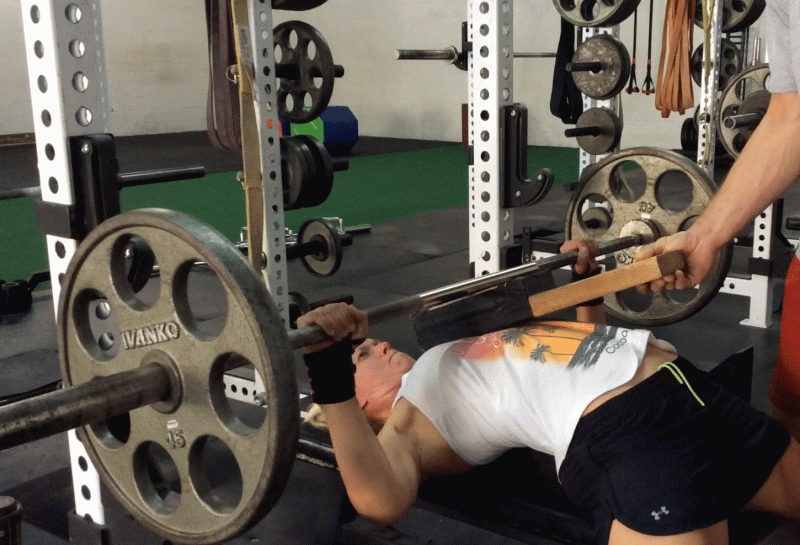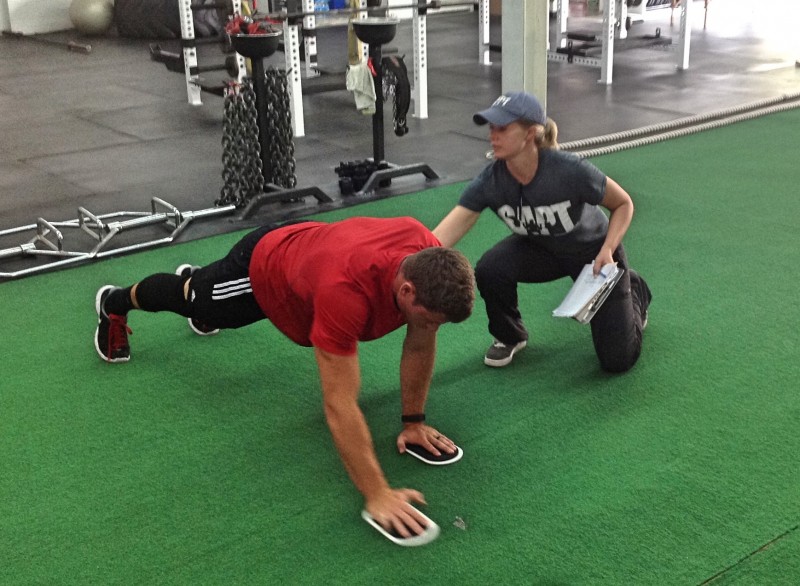
Essential to the discipline of strength training is discomfort. Once an athlete accepts this truth, they may begin to realize their potential.
As a professional strength and conditioning coach, who happens to be female, I learned very quickly that if I wanted to realize my own career potential, I would need to be comfortable being uncomfortable.
Before we dive in, I’d like to get something straight: the field of strength and conditioning is both tough and rewarding for everyone, male or female. Success requires an extremely gritty personality. This article is designed to shed light on some of the challenges everyone will face as they set out, but with a special consideration to the uniqueness of being a female in an ultra-male dominated profession.
The number of strength and conditioning professionals who succeed in making a career in athletics are few and far between. Look to the ranks of women and the numbers drop even further. The reasons are many: low pay, long hours, a career that is not conducive to family life, a competitive industry, sexism, poor job security, low confidence from some athletes and coaches, etc.
WATCH: How to Implement Auto-Regulatory Training in a Team Setting
Over my years in the field, I have experienced a variety of accomplishments and challenges. I’ve had children, managed a wide variety of teams and sports at the NCAA Division I level, started and successfully grown a private training business, developed a software company, been actively involved in research projects, aided in development of numerous student-interns, and carved my niche in working with my dream athletes: professional women’s basketball.
I’ve faced the usual variety of challenges that everyone meets, but also some that are unique to women. I’ve been asked many times, “Why aren’t you smiling?” or, “Is your husband a coach, too? Oh, you own this by yourself?” What should be internal dialogues are mindlessly expressed outwardly as people try to figure me out and put me in a more familiar box. As a side note, statements like these are called micro-aggressions. They are subtle discriminatory comments, usually delivered unknowingly, and used to remind minority groups that they are just that: a minority.
There are a few more obvious in-job challenges: I’ve been hit on and asked out during team workouts, I’ve even been cursed at and belittled by someone who thought I would just “take it.”
Through this article, I’d like to offer up my experiences as something that I hope any strength professional can draw upon as they plan the landscape of their careers. However, it is decidedly weighted toward my unique experiences.
Everyone Starts Somewhere
Beginning your career in strength and conditioning is not much different than in any other field. You will be working with teams and athletes that do not necessarily live up to “the dream.” The hours will be long and the recognition for a job well done or a difference made in someone’s life will be few and far between. Prepare to give yourself a lot of pats on the back, because no one else is going to do it for you.
At the start of your career, you really have nothing to offer outside of a warm body with the bare minimum credentials. Understanding that will go a long way with your superiors.
Never Play Down
When you get your first opportunity, you need to dig your heels in. I started out with two very low priority teams and a few freshmen from another team. That was it. I was not getting paid well, nor was I particularly passionate about any of those groups, but it was my big chance. It was all I needed to get started.
You must leave no doubt that you can lead by example and display a huge amount of passion (even if it is manufactured). Again, at this point, you are replaceable.
In leading by example, you must develop your strength. It should be a short mental leap to see the importance and connection to construct your entire being, both literally and figuratively, on the concept of strength. Chances are, as a female, you are likely at a greater disadvantage than your male counterparts in this area.
Strength is a skill that can be developed. Make sure you are developing your skillset across the spectrum. Your daily training must be prioritized just like your coaching application, research time, and continuing education.
Sit at the Table
At first, you will be unsure of everything from your program design to your technical coaching abilities — and with good reason. But never play down. I often see this demonstrated by our female interns. The women often lose out on opportunities for experience and learning by allowing the male interns to step out in front. If you want to be in this field, you need to learn to work on your presence, or to “sit at the table,” as Sheryl Sandberg has popularized.
Fortunately, strengthening your body will also strengthen your presence. Do people notice you when you walk into a room? To be a leader, they need to. Work on this relentlessly throughout your career.
Maintaining a disciplined strength training schedule will build your legitimacy with your athletes and your coaches. Strength coaches not regularly involved in strength training are fakes. In my experience, these are the ones that lean too heavily on technology, the latest-and-greatest performance screens, and constantly cite study upon study to back up their methods. Don’t get me wrong, I created a technology company, use—what some would argue—is an excessively fussy screening process, and have been involved in a number of research projects. But those are all things I learned to utilize after I got the basics down. The basics are STRENGTH and CONDITIONING.
Hard Work and Simplicity
Understanding how to apply theory is crucial, but I’m always wary of the coaches who talk over people’s heads. I end up thinking they either want everyone to know they think they’re superior, or they don’t understand the concepts that well themselves. Simplicity is beautiful. If you can dig through the science and boil down a concept to an idea your athletes can understand, then you’ve done something significant.
Happily accept all opportunities to work with more teams, athletes, and coaches. At this point in your career, you are building the base: a strong foundation that will pay dividends in the coming years. This brief—though it may not feel that way—time period will never have a do-over. One and done. It’s time to grind.
MORE: Guidance from Veterans: Advice from the Best Female Coaches
I strongly recommend finding a position that requires you to work with many teams. I was very fortunate to receive a level of experience and responsibility that is unparalleled at the Division I level. Everything about that environment felt like a firehose to the face for seven years. Essentially all the athletes, sports, application, and research I could handle were available for me. It was fantastic.
Maybe you know where you ultimately want to end up and maybe you don’t. Keep an open mind and just keep working.
You’ve Gotten Your Start
After three to five years in the field, you’ve officially gotten your start. Maybe you’ve gotten married. Maybe you had kids. Now there is a different navigation you need. The reality is, you may not be able to or want to work constantly.
When it gets tough (and it will), ask yourself: How much do you love this career? If you don’t love it, you should leave. There is someone else more qualified than you and one thousand times more passionate. Make room for them!
If you do still love it, keep reading.
Do NOT—I repeat—DO NOT “opt out” of the field. What do I mean by opt out? I mean deciding it’s just “too hard” and you are going to bail for something else. The following are the most common complaints from those in the field who decide to leave:
- Low pay
- Having young children
- Competition
- Lack of career advancement
- Poor spousal support
Those are all very real and legitimate reasons to feel the strength and conditioning life is not for you. But, for the most part, there are either easy solutions or you just need to tough it out.
- Low Pay: There are endless ways to make money while you gain more experience and better footing in the field. I’ve known coaches that have worked as bouncers, personal trainers, and at other part-time endeavors to help with the day-to-day finances. There is nothing wrong with that. It doesn’t make our profession lesser.
- Kids: Having children is a game changer. It can be very tough to justify the time away from your family when you are still on an assistant’s salary. But, this is a fleeting point in your career.
- Competition: Carving your niche takes time and lots of experience. Along the way, you will be met with some serious competition. Persistence here, as in all areas of life, will pay off.
- Lack of Career Advancement: You’ve selected a career that has limited growth potential! It’s true. There are only a limited number of positions available in athletics departments across the country or with professional teams. Again, persistence pays off here.
- Poor Spousal Support: It will be a rocky road if your spouse can’t get onboard with the odd hours your career requires. This one doesn’t have an easy solution and I wouldn’t recommend toughing it out.
Personally, this is how I’ve dealt with the above:
- I started a business to make more money.
- My children rocked my world. There is no way to sugarcoat this one. But, I didn’t give up or give in.
- In dealing with competition, I just keep my head down and focus on doing the absolute best I can every day. Sounds corny, but it works.
- I created my own career advancement.
- With regard to spousal support, I am an extremely lucky woman. My husband is patient, supportive, and will take the bulk of the child rearing responsibilities when I am unavailable.
It’s A Career Now
After six to 10 years, you’re decidedly in the field at this point, but still struggling with or meeting for the first time the top five challenges above.
What should you expect? Once you’ve got at least six years of experience, you should expect to be qualified to apply for some great opportunities. If you are relying on your resume and low incidence of injury rates to get you something amazing, you're doing it wrong. The key to your next great position will be who you know, and who those people know.
You’re in a field that relies heavily on a “who do you know/who have you worked with” protocol. This boils down to, “Tell me someone, I trust that you’ve worked with so that I can find out if you’re worth the effort.”
If you’ve neglected networking, you're not going to have an easy time. My advice would be to start getting to know other coaches. The influential ones. Keep in touch with the sport coaches you’ve worked with who are now at other schools or working with athletes at the level you want to be. Be genuinely interested in cultivating relationships with these people.
Seriously, This Isn’t Working
What if along the way you really do need to change roles? For me, I had to stop coaching at a job I loved because I had just had my second child, I owned a business functioning at a full-time level, and had another business project I wanted to start. It just had to be done.
While I was hesitant to leave the college strength environment, it did not mean that I was leaving the field entirely. I took this opportunity to work with athletes of all ages and abilities. In fact, this was my opportunity to deeply carve my niche.
Find Your Niche
As your career matures, you’ll need to decide on what you really want your specialization to be. Receiving your first opportunity just gets you in on the ground level. Ultimately, you will want to work your way up to a corner office. Can you imagine? Working with your very own dream team or athletes of your choosing? That’s what the corner office represents: realizing the potential in your career.
Will you embrace the Olympic sports and be generally awesome at all of them? Do you desire to work with professional athletes? Or would you rather try your luck in the market by opening a private facility?
Whatever drives you, you must keep this in mind at all times and within sight on the horizon. By keeping in mind your long-term career goals, you can be certain your decision-making will align with them over the years.
I’ve been extremely fortunate to work with many exceptional coaches, trainers, athletes, and other staff. But I’ve also faced some tough times. If you have enough grit and strive for excellence every day, you’ll likely look back in a few years to discover a career that grew into something that really does fit “the dream.”
Sarah Walls has been a strength coach for over 12 years and worked with athletes at all levels of play. Most recently she was named the strength and conditioning coach for the WNBA’s Washington Mystics. Sarah is also an entrepreneur and owns three businesses: Strength & Performance Training, Inc., Concentric Brain, LLC, and Sarah & Family Electrical Services, LLC. Sarah and her husband, Ryan, have two children and reside in Springfield, Virginia.












1 Comment